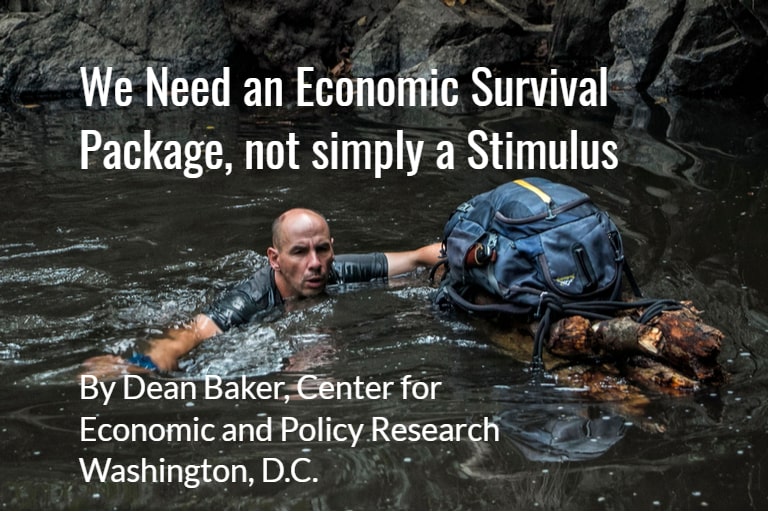By Dean Baker, Senior Economist, Center for Economic and Policy Research, Washington D.C.
I had planned to use my segment this week to outline an incremental approach to Medicare for All, since we are obviously not going to get there all at once, or at least not any time soon. (It starts with lowering the Medicare age to 64 and reducing payments to providers – the pharmaceutical industry, the medical equipment industry, and doctors — but you’ll have to tune in next week to get the full story.) But with the economy collapsing due to coronavirus and Donald Trump’s gang tossing out half-baked stimulus proposals, I decided to deal with the crisis at hand.
At the most basic level we have to understand the problem we face. The issue here is not what we typically face in a recession, with too little demand in the economy. People have money, and in principle are willing to spend, but the problem is that they don’t have the opportunity to spend. They can’t go to restaurants, movies, sports events, or travel. This is why sending out checks is silly. People will spend on necessities, but most of the money will be saved.
Our problem is not creating demand in the economy, the problem is keeping people more or less whole for a possibly extended period in which much of the economy is shut down. We also want to make sure that the economy can bounce back quickly when the crisis is over.
As far as the first part of the story, the Trump $1,200 check is grossly inadequate and misdirected. How far will $1,200 go if people are missing two months or even three months of paychecks. The median wage in the economy is a bit under $20 an hour. That comes to $800 a week or a bit more than $3,200 a month. A $1,200 check will not come close to keeping people whole through an extended shutdown period.
There are also many people who are not being hit by the crisis. People who are retired or who are still getting their paychecks should be doing just fine. There is no obvious reason to be sending these people $1,200 checks.
The alternative that I, and many other economists, have been pushing is a system like that adopted by Denmark and now the United Kingdom, where the government picks up the bulk of the pay (75 percent in the case of Denmark, 80 percent in the case of the UK) for workers who are being laid off. The payments are made directly to the companies, who then pay their workers. (In Denmark, the companies have to make up the remaining 25 percent of workers’ pay.)
The advantage of this route is that it can, as much as possible, keep workers whole through what could be an extended period of time where they cannot work at their regular jobs. It also takes advantage of the structures that are already in place. Workers getting paychecks from their employers will keep getting paychecks from their employers.
Also, the great aspect to this system over the send out checks route is that workers remain tied to their employers. At the end of the crisis, we will not be in a situation where millions of businesses suddenly have to find and train a new workforce. They can keep the same people on staff so that once the crisis is over they should be able to ramp up quickly to their pre-crisis capacity.
This is not the entirety of a survival package. There are workers who are self-employed or gig workers. These people need the opportunity to collect unemployment benefits based on their prior earnings. It should be possible to improvise a system of unemployment payments based on the 1099 forms that these workers should have filed in prior quarters.
There will still be some people who will fall through the cracks in these systems. At the very least we should be making eligibility for programs like Temporary Assistance to Needy Families and food stamps less strict in the crisis. This would mean, for example, temporarily eliminating work requirements. Incredibly, it seems the Trump administration is determined to go in the opposite direction.
State and local governments will also need large cash infusions during this period of crisis. Their main sources of revenue, income and sales taxes, will be going through the floor in the crisis. This is at a time where they will be facing enormous demands for medical care and other costly crisis-related measures. The federal government will have to reimburse these governments for the lost revenue and additional crisis-related expenses. (Yeah, Republicans are not likely to do this, but that should be a non-negotiable condition of any package going through the House.)
There are other measures that the federal government should have been doing a month or more ago to directly deal with the spread and treatment of the coronavirus. This includes ensuring an adequate supply of tests, face masks and other protective gear, ventilators, and emergency medical facilities.
It should also be rushing to train health care workers to do more mundane tasks, such as taking patients’ temperatures, changing bedding, and cleaning surfaces. This would free up time for badly overworked nurses and other more highly trained medical professionals. We also have to ensure that these and other essential workers have adequate child care arrangements.
Undoubtedly, other problems will arise that will have to be addressed if the economy is largely shutdown for two or three months, or possibly even longer. We have never experienced a situation where large segments of the economy are literally put out of business for a prolonged period of time.
The normal market mechanisms will not be working during this period, which means that the government will have to step in to address shortages of important items or emergency situations. This is a situation in which having a trustworthy and competent government really makes a difference. Unfortunately, we have Donald Trump.
Dean Baker is a macroeconomist and senior economist at the Center for Economic and Policy Research in Washington, D.C., which he co-founded. He previously worked as a senior economist at the Economic Policy Institute and an assistant professor at Bucknell University. He is the author of numerous books, including Rigged: How Globalization and the Rules of the Modern Economy Were Structured to Make the Rich Richer.
Note: The views expressed in this article are the author/s, and not the position of Intellectual Dose, or iDose (its online publication). This article is republished with permission.



